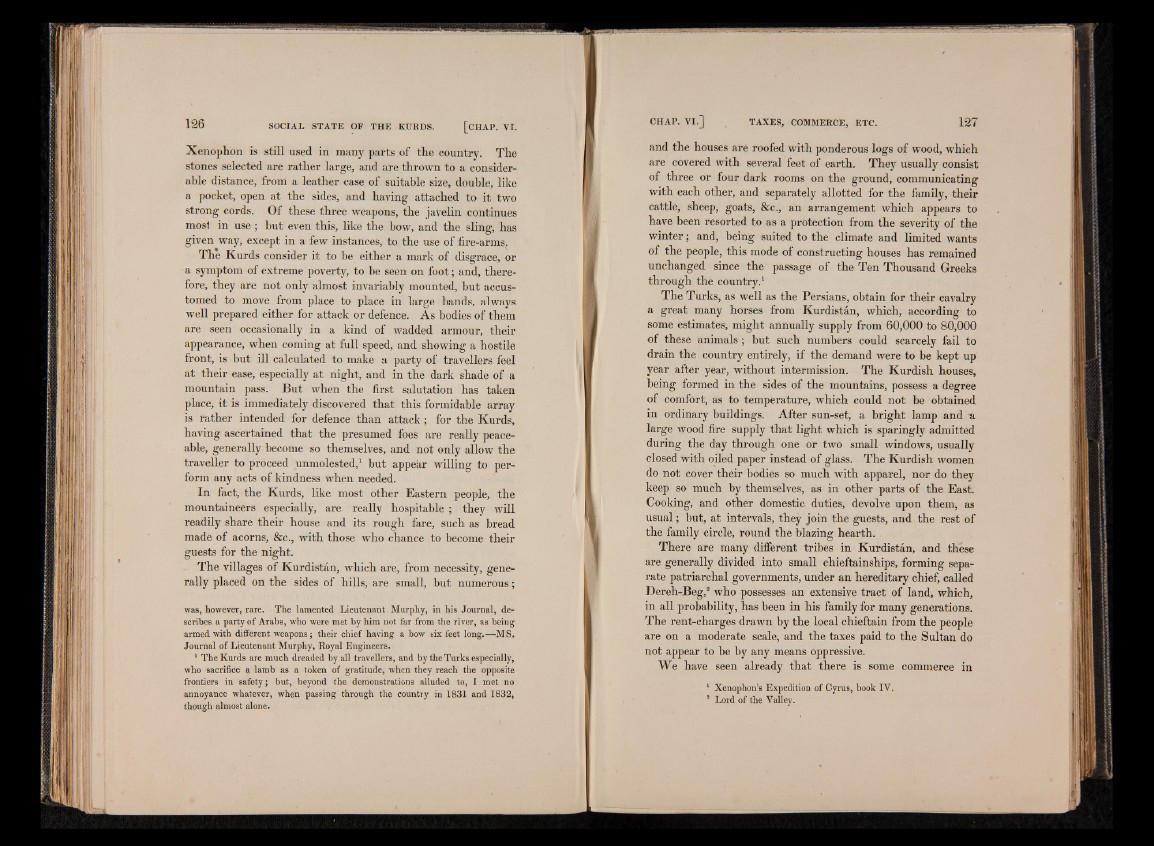
Xenophon is still used in many parts of the country. The
stones selected are rather large, and are thrown to a considerable
distance, from a leather case of suitable size, double, like
a pocket, open at the sides, and having attached to it two
strong cords. Of these three weapons, the javelin continues
most in use; but even this, like the bow, and the sling, has
given way, except in a few instances, to the use of fire-arms.
The Kurds consider it to be either a mark of disgrace, or
a symptom of extreme poverty, to be seen on foot; and, therefore,
they are not only almost invariably mounted, but accustomed
to move from place to place in large bands, always
well prepared either for attack or defence. As bodies of them
are seen occasionally in a kind of wadded armour, their
appearance, when coming at full speed, and showing a hostile
front, is but ill calculated to make a party of travellers feel
at their ease, especially at night, and in the dark shade of a
mountain pass. But when the first salutation has taken
place, it is immediately discovered that this formidable array
is rather intended for defence than attack; for the Kurds,
having ascertained that the presumed foes are really peaceable,
generally become so themselves, and not only allow the
traveller to proceed unmolested,1 but appear willing to perform
any acts of kindness when needed.
In fact, the Kurds, like most other Eastern people, the
mountaineers especially, are really hospitable ; they will
readily share their house and its rough fare, such as bread
made of acorns, &c., with those who chance to become their
guests for the night.
The villages of Kurdistan, which are, from necessity, generally
placed on the sides of hills, are small, but numerous;
was, however, rare. The lamented Lieutenant Murphy, in his Journal, describes
a party of Arabs, who were met by him not far from the river, as being
armed with different weapons; their chief having a bow six feet long.—MS,
Journal of Lieutenant Murphy, Royal Engineers.
1 The Kurds are much dreaded by all travellers, and by the Turks especially,
who sacrifice a lamb as a token of gratitude, when they reach the opposite
frontiers in safety; but, beyond the demonstrations alluded to, I met no
annoyance whatever, when passing through the country in 1831 and 1832,
though almost alone.
and the houses are roofed with ponderous logs of wood, which
are covered with several feet of earth. They usually consist
of three or four dark rooms on the ground, communicating
with each other, and separately allotted for the family, their
cattle, sheep, goats, &c., an arrangement which appears to
have been resorted to as a protection from the severity of the
winter; and, being suited to the climate and limited wants
of the people, this mode of constructing houses has remained
unchanged since the passage of the Ten Thousand Greeks
through the country.1
The Turks, as well as the Persians, obtain for their cavalry
a great many horses from Kurdistan, which, according to
some estimates, might annually supply from 60,000 to 80,000
of these animals; but such numbers could scarcely fail to
drain the country entirely, if the demand were to be kept up
year after year, without intermission. The Kurdish houses,
being formed in the sides of the mountains, possess a degree
of comfort, as to temperature, which could not be obtained
in ordinary buildings. After sun-set, a bright lamp and a
large wood fire supply that light which is sparingly admitted
during the day through one or two small windows, usually
closed with oiled paper instead of glass. The Kurdish women
do not cover their bodies so much with apparel, nor do they
keep so much by themselves, as in other parts of the East.
Cooking, and other domestic duties, devolve upon them, as
usual; but, at intervals, they join the guests, and the rest of
the family circle, round the blazing hearth.
There are many different tribes in Kurdistan, and these
are generally divided into small chieftainships, forming separate
patriarchal governments, under an hereditary chief, called
Dereh-Beg,2 who possesses an extensive tract of land, which,
in all probability, has been in his family for many generations.
The rent-charges drawn by the local chieftain from the people
are on a moderate scale, and the taxes paid to the Sultan do
not appear to be by any means oppressive.
We have seen already that there is some commerce in
1 Xenophon’s Expedition of Cyrus, book IV.
! Lord of the Valley.